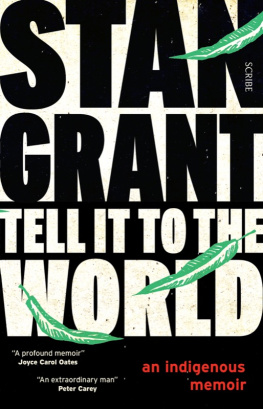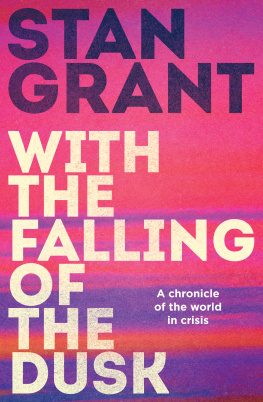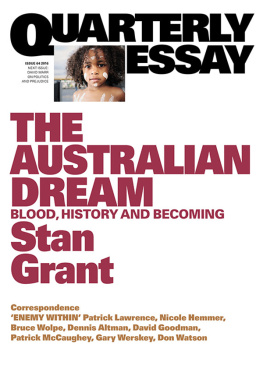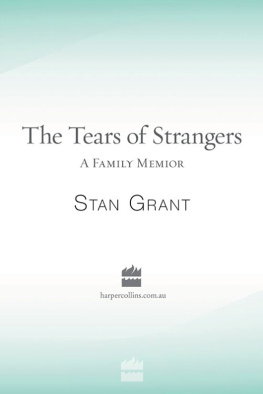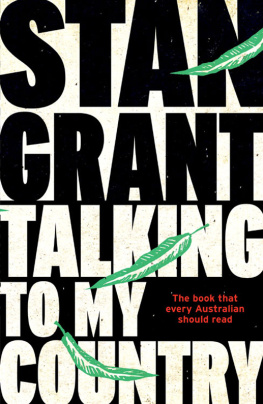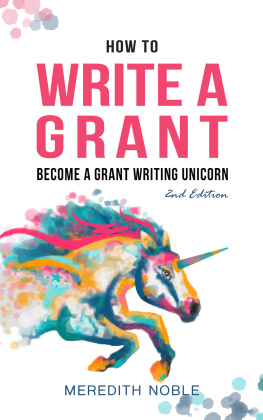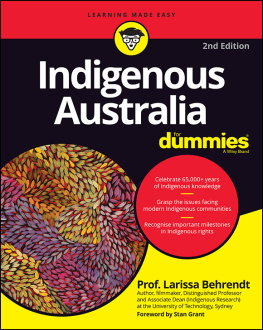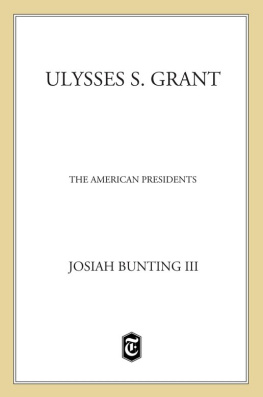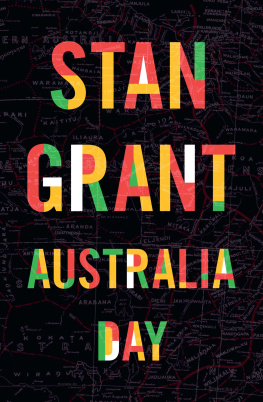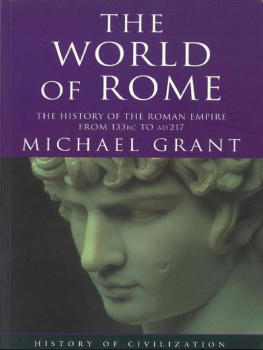
TELL IT TO THE WORLD
Stan Grant is an award-winning journalist and author. He is currently the global affairs and indigenous affairs analyst at the Australian Broadcasting Corporation. Prior to this, he worked as the indigenous editor for The Guardian Australia, managing editor for National Indigenous Television, and international editor for Sky News Australia. From 2001 to 2012, he served as a senior international correspondent for CNN in Asia and the Middle East, broadcasting to an audience of millions around the world. Stan is of Aboriginal ancestry, from the Wiradjuri people.
Scribe Publications
1820 Edward St, Brunswick, Victoria 3056, Australia
2 John St, Clerkenwell, London, WC1N 2ES, United Kingdom
3754 Pleasant Ave, Suite 100, Minneapolis, Minnesota 55409 USA
First published as Talking to My Country in 2016 by HarperCollins Publishers Australia Pty Limited
Published as Talking to My Country by Scribe in the UK 2016
Published by Scribe in North America 2019
Copyright Stan Grant 2016
All rights reserved. Without limiting the rights under copyright reserved above, no part of this publication may be reproduced, stored in or introduced into a retrieval system, or transmitted, in any form or by any means (electronic, mechanical, photocopying, recording or otherwise) without the prior written permission of the publishers of this book.
The moral right of the author has been asserted .
Lines from Theme for English B (Hughes) reproduced with kind permission by Harold Ober Associates Incorporated.
Lyrics from She Cried , written by Frank Yamma ( Mushroom Music Publishing ), reproduced with kind permission.
Lyrics from Took the Children Away , written by Archie Roach ( Mushroom Music Publishing ), reproduced with kind permission.
9781947534261 (US edition)
9781925938005 (e-book)
scribepublications.com
To my grandmother Ivy and my wife Tracey white women who have loved us.
So will my page be Colored that I write?
Being me, it will not be white.
But it will be
a part of you
You are white
yet a part of me, as I am a part of you
Sometimes, perhaps you dont want to be a part of me.
Nor do I often want to be a part of you.
But we are, thats true!
Langston Hughes: Theme For English B
Contents
Introduction
I was about thirteen years old when I discovered James Baldwin. I stumbled upon his novel Go Tell It on the Mountain .
It was the title that drew me in. I had always loved the song Go Tell It on the Mountain. Like Baldwin, I had a lot of religion in me. Old-time religion. Like Baldwin, I had been raised in the church the black church.
This was the church of fire and brimstone. This was the church of sin and redemption. We worshipped the sacrificial Jesus of the cross. Matthew 27:46: Eloi, Eloi, lama sabachthani? My God, my God, why hast thou forsaken me?
For we were the forsaken. Ours was the King James Bible not for us any standardized version. We wanted the sound of the word of God. We loved how the old words rolled around our tongues.
My mother would spit my hair down and put me in my best shorts and shirt each Sunday to go to the mission church. My uncle my fathers brother was the pastor. It was an exalted position in our community. Drunks would stand up straighter when he walked by, and mothers would silence their kids.
My uncle played his role with aplomb. I can still hear him thundering from the pulpit, a handkerchief mopping the sweat from his brow as he pointed at the congregation. We knew he was talking to us.
Luke 17:2: It were better for him that a millstone were hanged about his neck, and he cast into the sea, than that he should offend one of these little ones.
His words hung as heavy as the air, my nausea rising with the heat, my neck stiffening as my temples throbbed. It was all I could do not to flee the church. I knew outside the air was sweet with fruit from the orchards that bordered the mission.
The fast-running currents of the irrigation channel promised relief from the swelter. The channel was a foreboding place. It had taken the lives of so many of our people who had fallen in, drunk. The channel was guarded by a blanket of sharp-edged burrs catheads, we called them jagged, vicious things that, once piercing the skin, would burn for hours.
Cooped in that little wooden church with my uncles shout and spit, I would risk it all to run. But of course I couldnt escape my mothers eye she would cast me sideways disapproving glances when she sensed my irritation growing.
The hymns we sung were old and forlorn. The Old Rugged Cross, Amazing Grace, Shall We Gather at the River:
Soon well reach the silver river,
Soon our pilgrimage will cease,
Soon our happy hearts will quiver
With the melody of peace.
All of these songs promised a better day because a better day was all we could hope for.
These days of sermon and song prepared me for James Baldwin. Go Tell It on the Mountain was the story he had to tell. It was his life in the church. It was his life among his people. Here was the story of two brothers, John and Roy, their father, the preacher histories hidden, bodies buried, and children left to untangle a familys secrets.
This was the world slavery made. It came out of the black American experience, but it spoke powerfully to me, a boy from another world and time.
I was an Australian Aboriginal boy living in a family that had been banished from their country; like so many Aboriginal families black families we had been excluded and segregated. We were outcasts, existing on the margins of small towns in the Australian outback.
Thats why Baldwin spoke to me: he reached across worlds to make sense of mine. I was in love with books and words, hungry for ideas. Baldwin sounded like home. We were living in a world that could not see us, and Baldwin made me visible.
Before Baldwin, books were entertainment. I spent many hours with Mark Twain, Robert Louis Stevenson, Charles Dickens, Arthur Conan Doyle. My mother would scrounge books wherever she could. I dont recall much in the way of birthday or Christmas presents a scooter and a bike stand out but I devoured my most treasured gift, a book of Greek myths.
I was transported to the world of Icarus and Narcissus and Zeus.
But Baldwin fixed me in the firmament the place between worlds separating the waters of the white and the waters of the black. Here was a place for me. Here was a writer of courage and truth. The people of his book arrived fully formed; they didnt exist as a reflection of whiteness, this wasnt blackness as imagined, but real and flawed and courageous and pitiful. These were people who surprised and disappointed. These were people black people who were human.
Baldwin said, I wish only to be an honest man and a good writer.
He was both. A black man confronting his countrys legacy of racism. A son confronting his fathers hypocrisy. A gay man confronting his sexuality. He became a touchstone for me.
After Go Tell It on the Mountain , I devoured whatever I could find. Baldwins essays were searing meditations on race and history, each line quotable and a lesson in life. Words so brutally rendered that they make me wince even now. Words now unutterable and almost unthinkable.
For the state, a nigger is a nigger is a nigger sometimes Mr or Mrs or Dr Nigger.
They speak to the America of Black Lives Matter, the America that has questioned the citizenship of the first black president, as powerfully as they spoke to the Jim Crowsegregated south.
In Nobody Knows My Name , he wrote: I have spent most of my life watching white people and outwitting them so that I might survive.
Next page
